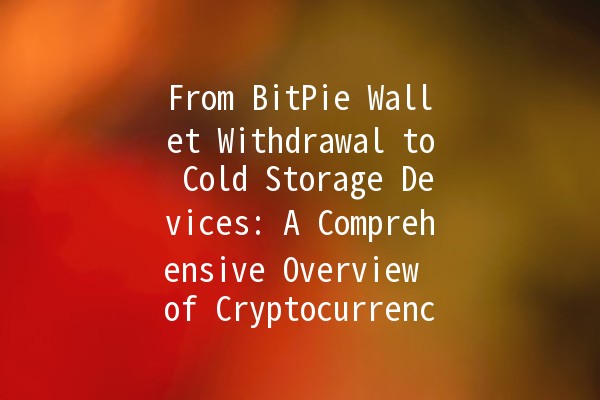
Cryptocurrency has emerged as a revolutionary asset class, offering immense opportunities for investment and financial independence. However, with these opportunities come the responsibilities of securely managing your digital assets. One critical aspect of cryptocurrency management is the process of withdrawing funds from wallets like BitPie to more secure cold storage devices.
This article dives into the world of cryptocurrency security, particularly focusing on the transfer process from BitPie, a popular multicurrency wallet, to cold storage devices. We will explore strategies to enhance productivity and security when managing your digital assets, ensuring you navigate this landscape with confidence.
Understanding BitPie Wallet
BitPie Wallet is a multicurrency digital wallet that allows users to manage various cryptocurrencies seamlessly. It offers features such as:

UserFriendly Interface: Easy navigation for all cryptocurrency users.
MultiCurrency Support: Store a wide range of cryptocurrencies in one place.
InApp Exchange: Swap cryptocurrencies without needing to leave the app.
Why Withdraw from BitPie to Cold Storage?
While BitPie provides sufficient security for everyday transactions, withdrawing to cold storage is crucial for longterm asset protection. Cold storage devices are offline and thus immune to online hacking attempts. This transition protects your investment against theft, unauthorized access, and potential loss due to technical failures.
Productive Tips for Withdrawal and Cold Storage Management
Managing cryptocurrencies efficiently demands a clear strategy. Here are five productive techniques to help you secure your assets during the withdrawal process and maintain them in cold storage.
One effective approach is to set a routine withdrawal schedule. This practice reduces the risk of keeping large sums in a hot wallet, such as BitPie, which is connected to the internet.
Application:
Monthly Withdrawals: If you earn regularly in cryptocurrencies, transfer to cold storage at the end of each month.
Threshold Amount: Set a specific threshold (like 0.5 BTC or an equivalent amount in other cryptocurrencies) that triggers an automatic withdrawal to your cold storage.
Implementing 2FA adds an extra layer of security when accessing your BitPie Wallet or making withdrawals. This step ensures that even if your password is compromised, unauthorized withdrawals are difficult.
Application:
Enable 2FA: Use applications like Google Authenticator or Authy to generate timesensitive codes.
Backup Codes: Store backup codes in a secure location in case you lose access to your 2FA device.
Before making a withdrawal, it’s crucial to triplecheck the cold storage address. Sending funds to the wrong address is irreversible.
Application:
CopyPaste Madness: Copy your cold storage address directly from your device rather than typing it manually to avoid errors.
Test Transaction: Send a small amount first, verify receipt, then transfer the larger sum.
When choosing a cold storage device, opt for hardware wallets from reputable manufacturers. These devices store your private keys offline, considerably minimizing hacking risks.
Application:
Top Brands: Consider options like Ledger Nano S, Trezor, or KeepKey, known for their security features and reliability.
Firmware Updates: Always keep the wallet's firmware updated for the latest security patches.
With the everevolving landscape of cryptocurrency, staying informed about the latest security practices, potential threats, and emerging technologies is vital for protecting your assets.
Application:
Follow Cryptocurrency News: Subscribe to reputable sources for insights into market trends and security updates.
Join Online Communities: Platforms like Reddit and Bitcointalk are great for learning from experienced cryptocurrency enthusiasts.
Common Questions About Cryptocurrency Withdrawal and Storage
Before withdrawing, you should consider transaction fees, the timing of your withdrawal in relation to market fluctuations, and the current network traffic, as these factors can impact the efficiency and cost of your transaction.
While cold storage devices are significantly more secure than hot wallets, risks remain, such as physical theft, loss, or damage. Ensuring you have multiple backups or a recovery plan in place can mitigate these risks.
It’s advisable to update your cold storage device’s firmware regularly, as manufacturers often release updates that enhance security and functionality. Check the device’s official website for the latest instructions.
Yes! Utilizing multiple cold storage devices offers redundancy and increased security. You could separate your holdings based on risk tolerance, storing smaller amounts in different devices.
In case of loss, ensure you have backup phrases written down securely. Most hardware wallets provide recovery phrases which can recover your wallet on a new device.
Using portfolio tracking applications will help you keep an overview of your assets across different wallets. These applications allow you to input your holdings and keep track of price changes, performance, and more.
al Thoughts
Safeguarding your cryptocurrencies is crucial in today's digital age. Transitioning from a hot wallet like BitPie to a secure cold storage device helps ensure that your assets remain protected against threats. By implementing effective strategies and staying informed, you can confidently manage your digital assets while optimizing for security and productivity. 🛡️📈
Employ these practical tips and techniques, and enjoy peace of mind knowing that your cryptocurrency investments are in safe hands.

